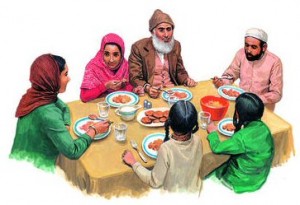6. Fasting elevates the human spirit and increases our awareness of God. It strengthens our will-power as we learn to rise above our lower desires. The institution of fasting is both unique and a shared experience in human history. From the very beginning of time, humans have struggled to master their physical and psychological selves: their bodies and their emotions. Hunger is one the most powerful urges that we experience. Many, through over- or under-eating or consumption of unhealthy foods, abuse this urge. Thus, when a person purposefully denies something to their own self that it craves, they are elevating their mind above their body, and their reason and will above their carnal passions. “A fasting person empties his stomach of all the material things: to fill his soul with peace and blessings, to fill his heart with love and sympathy, to fill his spirit with piety and Faith, to fill his mind with wisdom and resolution,” says H. Abdalati in Islam in Focus. The person who can rule their desires and make them work, as they like, has attained true moral excellence.
7. With the clarity of mind and absence of distractions, also comes a greater focus. As students, the period of fasting, especially early during the day, serves as a tool to focus our minds on our academics. In the month of Ramadan, many Muslims try to avoid watching TV, listening to music, and some other leisure activities, which spares them more time and energy to be spent on more productive activities such as academics, intense study of Islam, voluntary prayers, social and humanitarian causes, and a quality time with the family, to name a few. It is a reminder of our duty to God, our purpose and higher values in life, as God Himself describes the purpose of fasting as follows, “O you who Believe! Fasting has been prescribed for you as it was prescribed for those before you, so that you may develop consciousness of God” (Quran 2:183).
8. Fasting has numerous, scientifically proven, benefits for our physical health and mental well-being. The time, length and nature of the Islamic Fast all contribute to its overall positive effect. One of the medical benefits is a much-needed rest to the digestive system. The reduced food intake during the day allows the body to concentrate on getting rid of harmful dietary toxins accumulated as natural by-products of food digestion throughout the year. The length of the Islamic Fast itself (around 12-14 hours) is in sync with the ‘transit time’ of food from the mouth to the colon of the large intestine, ensuring that no stimulus reaches the stomach or digestive system while it remains in homeostasis. Therefore, for the vast majority of healthy individuals fasting poses no medical risks but in fact provides many health benefits, such as: an increase in serum Magnesium, essential for cardio-vascular health and prevention of heart complications; improvement in the quality and depth of sleep;
improvement in memory and slower skin aging over time; increased production of growth hormone, etc. Also, as a general note, it has been observed that underfed animals live longer than their heavily fed counterparts and suffer fewer illnesses during their lives.
9. The month of Ramadan provides us with a sort of “Boot camp.” It is a month of intense moral training. Since we know that Fasting is a special duty prescribed by God, we learn that any sins may spoil our record of fasting with God, so we go through great lengths making sure we are on our best behavior. Many people who experience fasting in this month, feel the impact that this intense training has on their habits, and realize the power of this transformative tool designed to make us better human beings- the ultimate goal of any spiritual exercise. The entire Ramadan atmosphere provides the driving force for this positive change.
10. It makes us realize the reality of life and death. Fasting makes us realize how dependant our lives are on things that we often take for granted, such as food and water. It makes us think about our dependence on God and God’s mercy and justice. Moreover, it reminds us of the life after death, which itself has a great impact on our character and our world-view.
11. Ramadan is a blessed month for a special reason: It is actually the month in which God first revealed His final message and guidance for mankind to our beloved Prophet Muhammad. This message has been perfectly preserved both orally and textually in the form of a Book, called the Qur’an (The Reading/Recital). Therefore, Muslims try to do an intense study of the Quran in this month especially, and evaluate their lives according to the standards and guidance contained in it.
12. After the month of Ramadan is over, Muslims celebrate one of the two most important holidays in the Islamic year: EID-UL-FITR, or the Festival of the Fast Breaking. It is a day to thank God for the blessing and training that He provides us with throughout the month of Ramadan. EID-UL-FITR is marked by praying in a huge congregation at an Islamic center or mosque, and by giving a small donation to the poor in the community. The adults give the donation on behalf of their children as well. Dinner parties, family outings, fairs, carnivals, and great joyous celebrations follow the prayer and charity.
In a nutshell, even though the real purpose of the dynamic institution of Fasting is to discipline our soul and moral behavior, and to develop sympathy for the less fortunate, it is a multi-functional and a comprehensive tool of change in various spheres of our lives, including: social and economic, intellectual and humanitarian, spiritual and physical, private and public, personal and common, inner and outer —all in one!
source : http://www.islamicity.com







